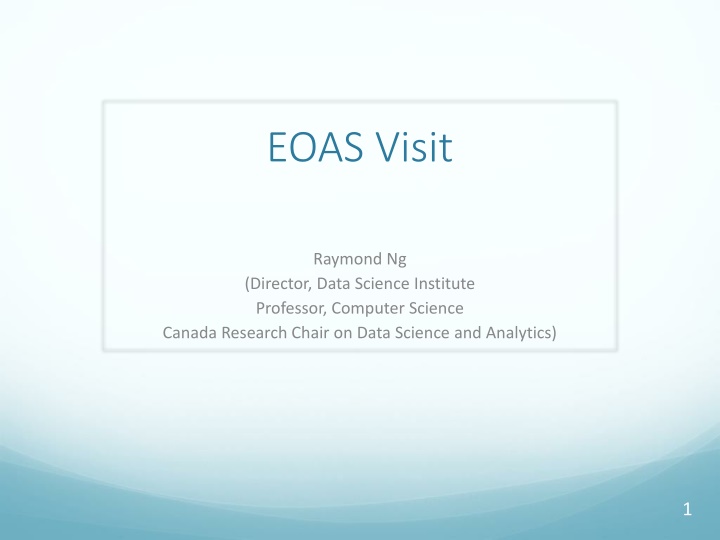
Data Science Institute at UBC - Key Programs & Research
Discover the Data Science Institute at UBC, its mission to advance data science research, interdisciplinary teams, training programs, and post-doctoral funding opportunities. Learn about the significance of data science in driving innovation and decision-making for organizations. Explore the 4Vs challenge in EOAS research, focusing on project examples in marine environmental research infrastructure and the essential aspects of data - variety, veracity, and velocity. Gain insights into the role of the Data Science Institute in scientific match-making, team formation, and advancing data science solutions.
Download Presentation

Please find below an Image/Link to download the presentation.
The content on the website is provided AS IS for your information and personal use only. It may not be sold, licensed, or shared on other websites without obtaining consent from the author. If you encounter any issues during the download, it is possible that the publisher has removed the file from their server.
You are allowed to download the files provided on this website for personal or commercial use, subject to the condition that they are used lawfully. All files are the property of their respective owners.
The content on the website is provided AS IS for your information and personal use only. It may not be sold, licensed, or shared on other websites without obtaining consent from the author.
E N D
Presentation Transcript
EOAS Visit Raymond Ng (Director, Data Science Institute Professor, Computer Science Canada Research Chair on Data Science and Analytics) 1
What is Data Science? What is Data Science? Refers to methods, processes and tools that allow a user to extract useful information from complex often large data collections Is an interdisciplinary field involving many areas in computer science, statistics and mathematics: Data mining, machine learning, statistical inference, predictive modeling, databases, visualization, high performance computing, linear algebra, data privacy, security, etc. Is critical for organizations and companies to make decisions and drive innovation
How the 4Vs Challenge EOAS Research How the 4V s Challenge EOAS Research? ? E.g., (My own project) Marine Environmental Research Infrastructure for Data Integration and Application Network (CFI Cyber-Infrastructure, Dalhousie, UBC, Uvic) Volume rapid advances in technologies, e.g., sensors, imaging Variety building multi-faceted models Veracity the truthfulness/reliability/quality of data and data sources Velocity the speed that data are collected/generated 3
What What is the Data is the Data Science Institute (DSI)? (DSI)? Science Institute UBC Senate approved in May 2016 and officially inaugurated in July 2016, currently administered in the Faculty of Science Mission: advancing data science research and development in UBC and BC 1. Forms and supports interdisciplinary research teams 2. Provides leading-edge training to post-doctoral fellows and graduate students 3. Enables a network of researchers and organizations to develop solutions for their data-rich applications
What is What is a a Key DSI Program? Key DSI Program? Many researchers who face data science problems may not know what can be done, and not know who to turn to DSI provides scientific match-making Helps to form teams to solve these problems, as well as to advance data science research and development Provides short-term post-doctoral seed funding - $40K to generate intermediate results and to show a functioning team In return: the team needs to submit a team grant to continue the research
Postdoc Postdoc Matching Fund Projects Matching Fund Projects Large-scale Bayesian modelling of drug resistance and evolution in human cancers at single-cell resolution Data science over graphs, streams, and sequences: From the analysis of fake news to prediction and intervention Automated diagnosis and prognostication of severity in COPD via deep learning frameworks using multi-modal data From heuristics to guarantees: the mathematical foundations of algorithms for data science Modeling multiple types of "omics" data to understand the biology of human exposure to pollution and allergens User modeling and adaptive support for MOOCS Using text analysis for chronic disease management Application of deep learning approaches in modelling cheminformatics data and discovery of novel therapeutic agents for prostate cancer A platform for interactive, collaborative, and repeatable genomic analysis
Thank You! (Especially, on using one of your labs) rng@cs.ubc.ca (dsi.ubc.ca)
